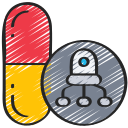
Data-Driven Insights: AI's Potential in Tailoring Medical Care
Data-driven insights are revolutionizing the way medical care is delivered, enabling healthcare professionals to harness advanced technologies for personalized patient treatment. The integration of artificial intelligence into clinical workflows allows for deeper analysis of vast healthcare data sets, uncovering patterns that were previously impossible to detect. With AI’s predictive power and adaptive algorithms, every aspect of patient care can be optimized, from diagnosis to treatment planning. Exploring these AI capabilities reveals a future where medicine is not only more precise but also inherently patient-centric, transforming general healthcare into bespoke medical experiences.
The Role of AI in Personalized Diagnostics
Advanced Imaging Interpretation
Medical imaging technologies such as MRI, CT scans, and X-rays generate colossal amounts of data that can be daunting for manual assessment. AI-driven analytics excel at parsing these images, rapidly pinpointing signs of cancer, neurological diseases, or cardiovascular conditions. By recognizing patterns invisible to the naked eye, AI algorithms can highlight regions of concern with exceptional accuracy, supporting radiologists and reducing diagnostic uncertainty. The increased speed and precision also mean that patients receive diagnoses faster, facilitating quicker intervention and improving overall outcomes.
Genomic Data Analysis
AI’s application in genomics is unlocking a new dimension in personalized healthcare. By sifting through a patient’s entire genetic code, AI systems can identify mutations and biomarkers linked to specific illnesses, enabling clinicians to anticipate disease risks and select targeted therapies. The scalability of these tools allows for the assessment of vast genetic datasets that would otherwise be unmanageable, ensuring no crucial detail is missed. This level of analysis paves the way for preventive care and custom-tailored treatments that cater to each individual’s unique genetic makeup.
Predictive Disease Modeling
Predictive modeling powered by AI utilizes data from electronic health records, wearable devices, and lifestyle information to forecast the likelihood of disease onset or progression. These predictive insights give healthcare providers the ability to intervene proactively, either by modifying treatment plans or by recommending lifestyle adjustments suited to the patient’s risk profile. This forward-looking approach shifts healthcare from reactive to proactive, emphasizing prevention and early intervention while enhancing the personalization of care.
AI-Powered Treatment Recommendations
Every patient responds differently to treatment, and what works well for one individual may not be effective for another. AI-powered platforms monitor real-time responses to therapies, analyzing patterns and outcomes to suggest timely adjustments. This enables treatment protocols to evolve dynamically, optimizing for efficacy at every stage. Over time, these adaptive systems continually refine their understanding of each patient’s needs, moving beyond “one-size-fits-all” medicine to interventions that are meticulously personalized.
Keeping abreast of rapidly evolving medical literature can be overwhelming for physicians. AI engines designed to scan, interpret, and synthesize the latest research findings ensure that clinicians receive up-to-date, evidence-based recommendations tailored to each case. By seamlessly integrating groundbreaking trials and treatment guidelines into patient care, these systems accelerate access to innovations and allow each patient to benefit from the collective wisdom of the global medical community.
One of the core challenges in medicine is anticipating and minimizing adverse reactions to treatments. By collating information from vast patient populations, AI algorithms can predict which combinations of medications and therapies are likely to result in negative side effects. This intelligence guides clinicians in crafting safer treatment regimens, improving patient safety and enhancing trust in the care process. Tailoring treatments in this way represents a major step toward risk-aware and patient-centric medicine.

Enhancing Patient Engagement and Adherence
Traditional health communications are often generic and miss the individual nuances that influence patient behavior. AI-driven systems tailor reminders, motivational messages, and educational content to each patient’s specific situation, health literacy, and preferences. By providing relevant and context-aware information at the right time, AI supports improved understanding of medical instructions, leading to greater adherence to prescribed regimens. This individualized approach enhances trust and establishes a stronger patient-provider connection.
